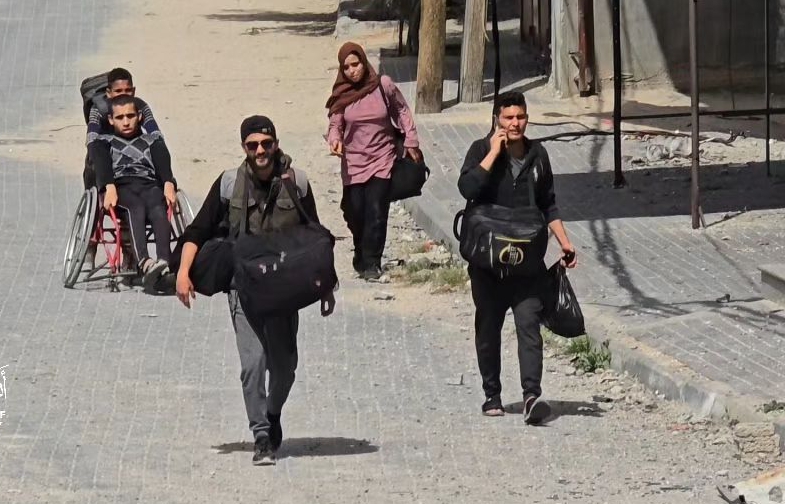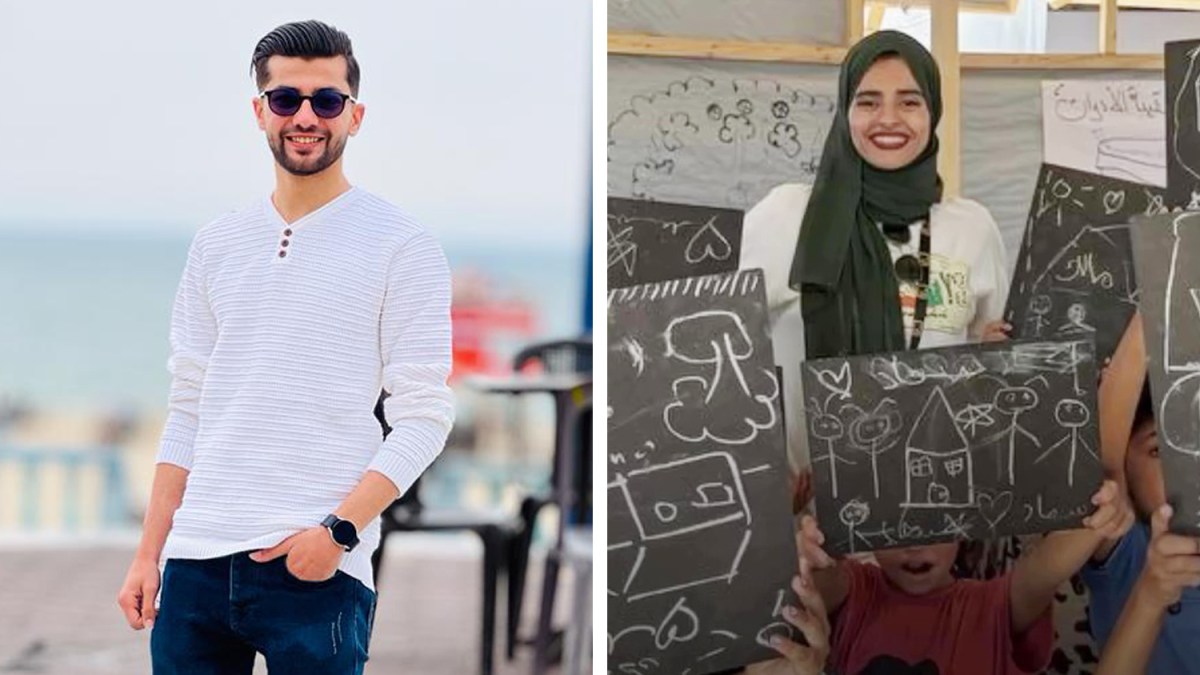When Karam Elradie won a scholarship to go to Manchester University to study computer science, he thought that by mid-August he would be on his way there, getting ready to move into his student halls.
Instead, on Saturday he and his family were fleeing the latest offensive in Gaza, moving for the 15th time since the war began in October 2023, as Israeli troops massed on the outskirts of Gaza City, the capital, to destroy what they claim is a Hamas stronghold.
An announcement over loudspeakers on Thursday informed Elradie, 26, and his family that the street where they had been living in the kitchen of his uncle’s home was on the red line in the latest evacuation map issued by the Israel Defence Forces: it was the next block to be targeted.
“We are surrounded by bombing,” he said. “They’re destroying whole streets using old military vehicles. They fill them with tonnes of explosives and blow them up in the narrow streets turning them into rubble.”
Two brothers he knows were the sole survivors from one of these so-called robot bombs that destroyed a nearby street. One of them lost his eye. After that, Elradie said, they had no choice but to leave.
On Saturday he and his mother, two brothers and two sisters — one of them pregnant, with a husband and two children in tow — packed up again. Leaving with only one spare set of clothes, as well as phones, chargers and Elradie’s precious laptop, they paid $300 (£221) to move the 11 miles south to Deir al-Balah, where thousands of displaced Palestinians are sheltering. Fuel in Gaza now costs about £79 a litre.
“Back in a tent again — it’s like we’re an ant colony running from place to place as people try to squash us,” he said.
“We already lost everything,” he shrugged. “Since October 7 we’ve faced displacement (multiple times), famine (several times), injuries (lots of times), we’ve buried friends and family members, our homes and land have been bulldozed, and we’ve been living in hell-like places — don’t even mention hygiene. There is nothing more to cry about.”

On the move again in Gaza: Karam Elradie, front left, has been displaced 15 times with his family
Apart from one thing: Elradie is one of about 80 students from Gaza who overcame astonishing hurdles to secure life-changing places at British universities this autumn, only to find they had been blocked from taking them up by Home Office bureaucracy.
To get their places, these students had transported exam papers by donkey carts, risking their lives travelling through danger zones to get a wi-fi signal to send an application. In Elradie’s case he did this with shrapnel in his leg from an Israeli airstrike.
Yet then they reached an obstacle they could do nothing about: the Home Office requires that they provide fingerprints to apply for a visa even though the only biometrics office in Gaza has been closed since October 7, 2023, leaving them with no means to do it.
Other countries such as France, Italy and Ireland have found workarounds and got their students out.
Last week nine students who have Chevening scholarships, funded by the Foreign Office and partner organisations, were contacted by the British government to say plans were under way for their evacuation. It followed a campaign and a letter from more than 100 MPs.
But the rest remain stranded.
“We understand rules are rules but rules should have a heart,” said Nada Alfarra, another Gaza student, who has a place at the University of Greenwich and is one of those with a Chevening scholarship.
“It’s so unjust,” said Elradie, who is not. “It’s destroying us.”
He sent me the contract to move into his student digs on September 6, for which he is paying £12,801 a year.
He was so upset by the news that he spent 30 shekels (£7) on four sachets of Nescafé, having not seen coffee for months. “Then I burnt my thumb boiling the water on a small fire,” he said.
“A partial evacuation is arbitrary and unfair,” said Nora Parr, a fellow at Birmingham University and one of a coalition of academics helping the Gaza students. “Like looking out at a lecture hall of students knowing only a few will be given access to the future they have worked so hard to achieve while the rest are left to the most horrific fate.”
• Living in Gaza, accepted to Cambridge — blocked by Home Office
Some of the stranded students have started a social media campaign, Gaza40, telling their stories. Among them is Leen, 25, who has a place to study law at Durham, which she says she wants to use to “build a better humanitarian system for Gaza”.
“We studied under drones, took our exams while displaced,” she said. “These places at UK universities were not handed to us, we fought for them, and now we cannot leave.”
“It’s totally unfair,” said Shaymma Abulebda, 32, a former English literature lecturer at the Islamic University of Gaza and a published poet, who has a place at Edinburgh University for a doctorate with a full scholarship from the Arts and Humanities Research Council.
“I am so happy for the nine Chevening scholars to be evacuated but if they can evacuate them, why not all of us? The UK government chose to make a distinction between scholars when we are all living through genocide, all uncertain of our days and future. It doesn’t make sense to choose some over others.”
Abulebda and her family have had to move 12 times, from east Khan Yunis, and are living in a tent in al-Mawasi near the beach with her parents, youngest sister and two aunts with their children — 13 in total.
“We were 14 but my nephew Abdelrahman, 18, was killed two weeks ago when he went to get food for us,” she said.
He had gone to get flour from one of the aid distribution centres set up by the controversial Israeli and US-backed Gaza Humanitarian Foundation (GHF). He was, she says, shot in the abdomen and chest from an IDF helicopter. “He bled for an hour and a half before he reached a hospital and the doctors there said there was nothing they could do. He died two hours later.”

Studying at Durham University remains a dream for Leen
DURHAM UNIVERSITY
More than 2,000 Gazans have been killed on their way to seek aid since the GHF was established in late May, according to the Hamas-run health ministry. On Friday the Integrated Food Security Phase Classification, a UN-backed body, reported that more than half a million people in northern Gaza were experiencing famine. António Guterres, the UN secretary-general, described the situation as a “failure of humanity itself”. Binyamin Netanyahu, the Israeli prime minister, called the finding an “outright lie”.
For many Gazans, though, hunger is not the only threat.
Abulebda said she and her family were living amid relentless bombardment. “We can hear bombing all the time — not only at night but during the day, all kinds of bombs, F-16s, and bullets, tank shells as tanks [are] approaching the centre and west of Khan Yunis and helicopters.”
Studying in one of the hallowed libraries of Edinburgh could not seem further away.
When she got her place in December she was overjoyed. “I was so excited because of the city’s literary history and also Edinburgh’s English department is very strong on post-colonial criticism, which I want to work on, along with Palestinian literature for my research project.
“I want to be a literature lecturer in Palestine and publish in respected journals and getting that place meant a longstanding dream was being fulfilled, but it doesn’t feel like that now.
“At the time I was thinking, OK, there will be a ceasefire and I will have plenty of time to arrange for a visa. Now term starts in two weeks and I have no idea how I can get out.”
Instead, as the days tick by, the hunger grows and the bombs keep dropping, she has been resorting to watching reels about Edinburgh on Instagram. “The city looks beautiful,” she said wistfully.
